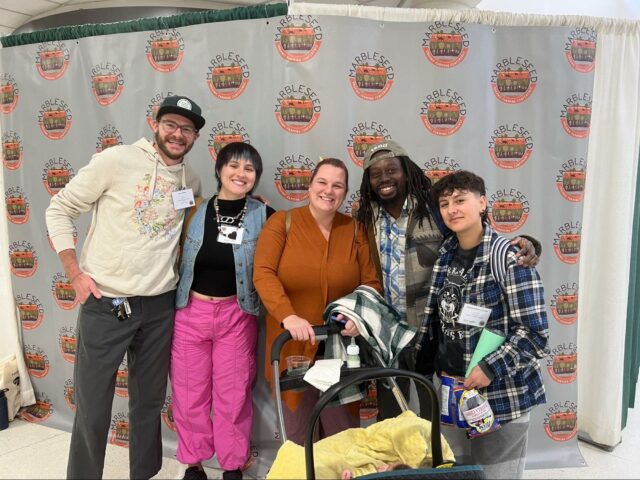Every February, the Marbleseed Organic Farming Conference is held near the beautiful Mississippi River in La Crosse, Wisconsin. The Driftless region of the Midwest, encompassing corners of Wisconsin, Iowa, and Minnesota, holds rolling hills and fertile farming communities. The conference (formerly known as MOSES) brings together farming communities across differences in acreage and access to land; urban and rural producers; and commodity, livestock, and mixed vegetable farmers. One thing that unites each of these different communities is a commitment to organic principles.
This year the conference kicked off with an open space style summit, where participants got to lead small group conversations about topics they wanted to discuss. This interactive tone of the conference encouraged attendees to meet new people. Conferences are great spaces for sharing knowledge, but making new connections is just as important. That’s why some of our Midwest staff hosted a Young Farmer Mixer during dinner on Friday night! Working with the Minneapolis nonprofit Renewing the Countryside, beginning farmers got to connect in a casual social space. Spaces that foster connections outside the conference are important for building networks, and connecting farmers across the midwest is one step towards more resilient farming.
Some conference sessions we enjoyed included: “Building Solidarity Between Family Farmers and Farm Workers” led by John Peck and a group of women farmworkers from La Alianza Nacional de Campesinas; “The Historical Context of Land Access in the US and Its Impacts on Indigenous Peoples” led by Bagwaj Kmett; “Overcoming Entry Barriers for Beginning and Immigrant Farmers’ led by Vitais Tita of Better Greens, LLC; and “Soil is Our Ancestor,” a session for us to connect around our relationships to soil, led by Ayana Sol Machado and Chrystal Odin of Philadelphia Farm.
Each of these sessions were focused on an understanding that building solidarity, addressing racial equity issues, and land access are foundational to creating a food system that is free of racial violence, accessible to communities, oriented towards environmental well-being, and concerned with health over profit. The conversations that came out of each session highlighted the fact that, without a foundational understanding of the historical context of racism and discrimination that informs modern day agriculture, no amount of innovation or technology can move us forward towards a sustainable future.
